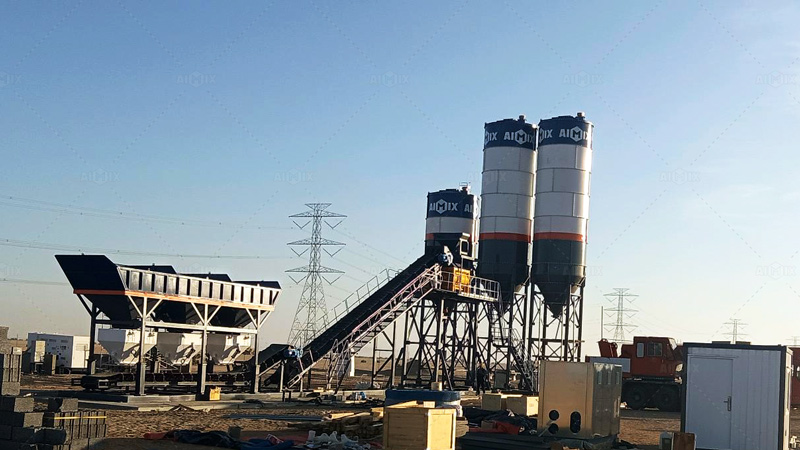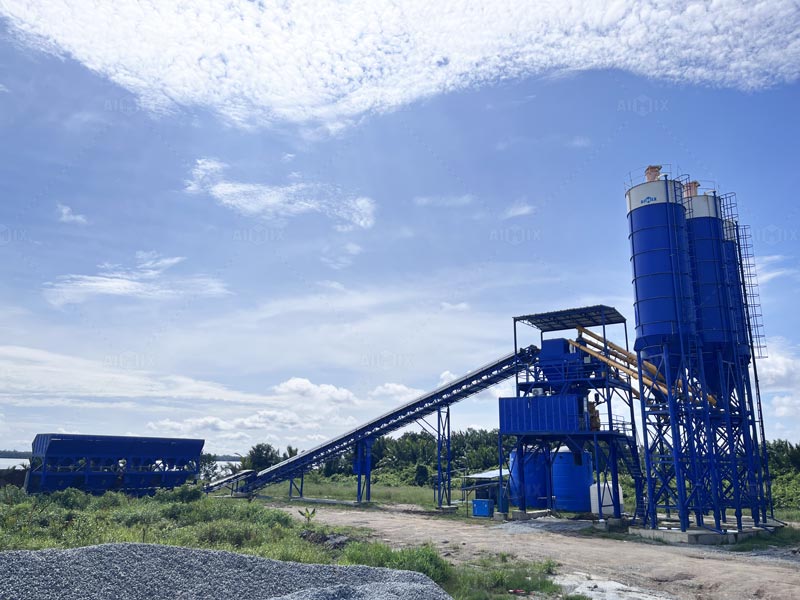Does a Ready-Mix Concrete Plant Need to Use a Water Heater?
The quality of concrete produced by a ready-mix concrete plant can be influenced by many factors, including temperature. In some situations, maintaining the right water temperature during the mixing process is essential for ensuring the desired consistency and strength of the concrete. This article explores whether a water heater is necessary for a ready-mix concrete plant and how it can impact the overall production process.
Contents |
[edit] The Importance of Temperature Control in Concrete Production
[edit] Temperature’s Impact on Concrete Mixture
Concrete is a complex mix of water, cement, aggregates, and sometimes additives. The chemical reaction between the cement and water, known as hydration, generates heat. This reaction is temperature-dependent, meaning the higher the temperature of the water, the faster the reaction occurs. Conversely, cooler temperatures can slow down the setting time and strength development of the concrete.
Maintaining proper temperature control is particularly important when producing ready-mix concrete, as it directly affects the workability, setting time, and durability of the concrete. Without proper temperature management, the concrete may not meet required specifications for different applications.
[edit] Why Do Some Ready-Mix Concrete Plants Use Water Heaters?
Water heaters are used in ready-mix concrete plants to control the temperature of the water used in mixing. In colder climates, particularly during winter, water temperature can drop significantly, leading to slower hydration rates. This can result in a delay in setting times, which may affect the project timeline.
By using a water heater, a ready-mix concrete plant can ensure that the water is at an optimal temperature, promoting faster hydration and better curing conditions. This is especially important for projects requiring quick turnaround times, such as road construction or large-scale infrastructure projects.
[edit] When Should You Consider Using a Water Heater in Your Ready-Mix Concrete Plant?
[edit] Cold Weather Conditions
In regions where temperatures drop significantly, especially below 5°C (41°F), using a water heater in your ready-mix concrete plant becomes crucial. Cold weather can have a detrimental effect on concrete curing, leading to poor strength development. A water heater ensures that the water is at the ideal temperature for mixing, which accelerates hydration and minimizes the risk of freezing.
[edit] Tight Project Deadlines
When there is a need to ensure that concrete sets quickly, especially in cases where rapid construction is required, such as in paving or large buildings, a water heater can speed up the setting time. It allows the plant to maintain the desired concrete production schedule, reducing delays and avoiding costly downtime.
[edit] Managing Workability and Consistency
Water temperature can also affect the workability of the concrete mix. Cold water can make the mix stiffer and harder to work with, while warm water can improve the fluidity of the mix, making it easier to transport and pour. For a ready-mix concrete plant, consistency in mix design is key, and maintaining an appropriate water temperature can help achieve that.
[edit] Alternatives to Water Heaters for Temperature Control
[edit] Insulating the Water Supply
For some plants, it may not be necessary to invest in a water heater. Instead, water supply lines can be insulated to prevent the temperature from dropping too low, especially if the water is stored in insulated tanks. This can help to keep the water above freezing temperatures in colder climates, without the need for active heating.
[edit] Using Chemical Accelerators
In addition to using heated water, chemical accelerators can be added to the mix to speed up the hydration process. These accelerators are effective at increasing the setting time of the concrete and are often used in conjunction with heated water, especially in situations where rapid strength gain is required.
[edit] Portable Concrete Batching Plant Solutions
For contractors on the move, a portable concrete batching plant can provide an alternative solution. Portable plants are often designed to be more adaptable to different environmental conditions. Some portable concrete batching plants come equipped with systems to heat water, providing added flexibility to ensure the mix remains workable, regardless of weather conditions.
[edit] Conclusion
A water heater can be a valuable addition to a ready-mix concrete plant, especially when working in colder climates or when quick-setting concrete is required. By ensuring that the water used in mixing is at the optimal temperature, you can enhance the workability, setting time, and final strength of your concrete. However, alternatives such as insulating water lines or using chemical accelerators may also offer viable solutions depending on your plant’s specific needs and operating conditions. Whether you’re working with a traditional ready-mix concrete plant or a portable concrete batching plant, understanding the role of water temperature is key to ensuring high-quality concrete production.
[edit] Related articles on Designing Buildings
- A Short Overview Of An Asphalt Batching Plant Workflow
- A Summary of Concrete Plants: Advantages, Applications, and Types
- Adapting To Site Conditions And Improving Efficiency In Complex Latin American Terrain
- Asphalt.
- Asphalt mixing plant types and considerations
- Binder course.
- Bituminous mixing and laying plant.
- Can a Mobile Asphalt Plant Mix While Moving?
- Carbon Neutrality and Circular Economy Drive Transformation of Mining Equipment in Latin America.
- Case Studies of Peru and Colombia: The Impact of Policies on Crushing Station Procurement
- Component parts of a mobile concrete plant
- Concrete batching plants
- Concrete batching plants; technical requirements for large-scale infrastructure projects
- Concrete boom pumps
- Concrete Pump Selection and Efficiency Improvement Strategies in Latin American High-Rise Building Construction
- Detailed Explanation of Pre-Installation Preparations for Aggregate Crushing Plants
- Does a Ready-Mix Concrete Plant Need to Use a Water Heater?
- Does the Installation of a Mobile Concrete Plant Require a Foundation?
- Fixed VS Mobile Asphalt Plants: Which is More Suitable for Project Contractors?
- Global Brands in Latin America and the Market Share of Asphalt Plant Manufacturers
- Groundwater control in urban areas.
- Highway drainage.
- How Chilean Projects Achieve Green And Intelligent Production With Concrete Batching Plants
- How Peruvian Crushing Plants Can Achieve High Capacity And Low Energy Use
- How to Configure Aggregate Production Lines to Achieve Maximum Benefits
- How to Reduce the Energy Consumption of Drum Asphalt Plants?
- Infrastructure.
- Investing in a Portable Concrete Plant
- Is a Self-Loading Concrete Mixer Suitable for Rugged Environments?
- Mastic Asphalt Council.
- Mastic asphalt flooring.
- Mobile asphalt stations.
- Multi-Point Mobile Stone Crushers Under Dispersed Raw Material Distribution
- Overview of the road development process.
- Potential environmental and circular economic value of concrete pumps
- Ready-Mix Vs Conventional Batching Plants: Intelligent Control Differences
- Road construction.
- Road joints.
- Runway construction.
- Self-loading concrete mixers
- Self-loading concrete mixer training and team management
- Small Concrete Plants vs Large Plants: Which One is More Suitable for Your Project Needs?
- Social Responsibility and Sustainability in Stone Crushing Plants in Latin America
- Technical Engineer's Perspective: Performance of Concrete Trailer Pumps in High-Rise Buildings
- The Impact of the Accuracy of the Weighing System on Asphalt Plants
- Top Rated Concrete Mixer Truck Parts In Your Town
- Tracked Mobile Aggregate Crusher Plant with Oil Electric Dual-use
- Types of road and street
- What Are the Basic Parameters of a Mobile Asphalt Plant?
- What Are The Hidden Advantages Of A Mobile Asphalt Plant That Can Be Remotely Monitored?
- Why Is the Concrete Trailer Pump Powerful?
- What to Look for in a Concrete Batching Plant
Featured articles and news
Inspiring the next generation to fulfil an electrified future
Technical Manager at ECA on the importance of engagement between industry and education.
Repairing historic stone and slate roofs
The need for a code of practice and technical advice note.
Environmental compliance; a checklist for 2026
Legislative changes, policy shifts, phased rollouts, and compliance updates to be aware of.
UKCW London to tackle sector’s most pressing issues
AI and skills development, ecology and the environment, policy and planning and more.
Managing building safety risks
Across an existing residential portfolio; a client's perspective.
ECA support for Gate Safe’s Safe School Gates Campaign.
Core construction skills explained
Preparing for a career in construction.
Retrofitting for resilience with the Leicester Resilience Hub
Community-serving facilities, enhanced as support and essential services for climate-related disruptions.
Some of the articles relating to water, here to browse. Any missing?
Recognisable Gothic characters, designed to dramatically spout water away from buildings.
A case study and a warning to would-be developers
Creating four dwellings... after half a century of doing this job, why, oh why, is it so difficult?
Reform of the fire engineering profession
Fire Engineers Advisory Panel: Authoritative Statement, reactions and next steps.
Restoration and renewal of the Palace of Westminster
A complex project of cultural significance from full decant to EMI, opportunities and a potential a way forward.
Apprenticeships and the responsibility we share
Perspectives from the CIOB President as National Apprentice Week comes to a close.
The first line of defence against rain, wind and snow.
Building Safety recap January, 2026
What we missed at the end of last year, and at the start of this.
























